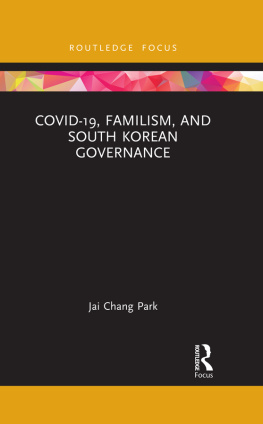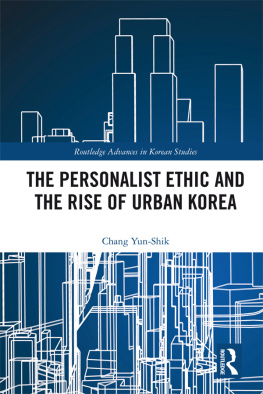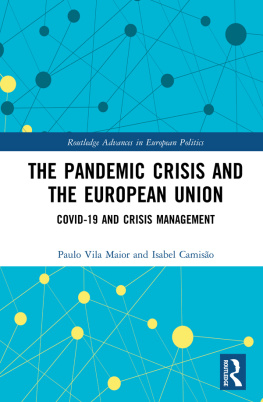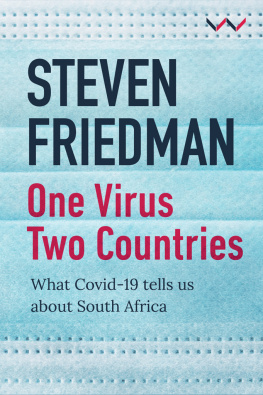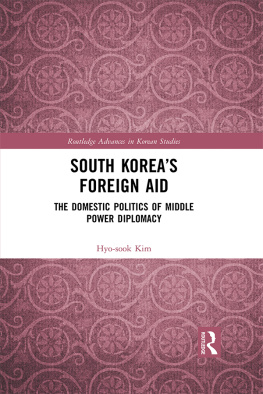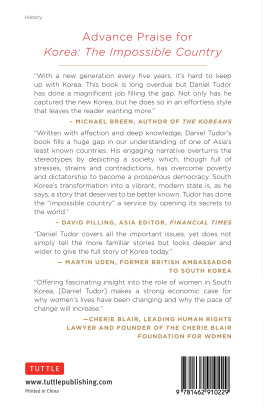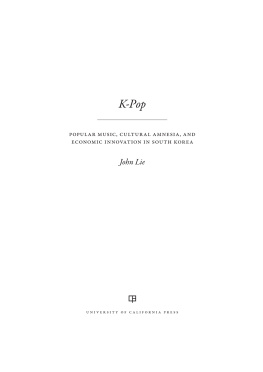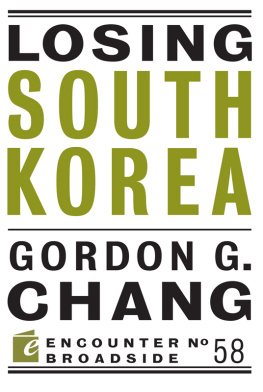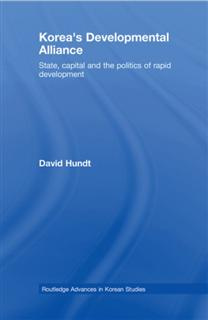COVID-19, Familism, and South Korean Governance
This book traces the factors that contributed to the success in controlling the COVID-19 pandemic in South Korea and identifies the concept of familism as a major environmental factor.
The government of South Korea has achieved remarkable outcomes in its COVID-19 response, despite the fact that South Korea usually promotes a family-focused investment of resources at the expense of broader social goals. The author eschews these Western cultural biases in theories of crisis management and suggests that the key component of South Koreas success is not self-centered egotism of individuals but a focus on family and familism, which projects state as an extension of family. He argues that, while the success in managing the COVID-19 epidemic is due to a combination of factors, familism has been a key force in driving this successful response to the COVID-19 outbreak.
The book will be of interest to scholars and students of governance, crisis management, civil society, and citizens participation in public administration, international relations, Asian studies, and cultural studies and Confucianism.
Dr. Jai Chang Park earned his doctorate in Public Administration from the State University of New York at Albany and is serving as a professor emeritus of the Public Administration Department at the Sookmyung Womens University in Seoul, Korea.
COVID-19, Familism, and South Korean Governance
Jai Chang Park
First published 2022
by Routledge
2 Park Square, Milton Park, Abingdon, Oxon OX14 4RN
and by Routledge
605 Third Avenue, New York, NY 10158
Routledge is an imprint of the Taylor & Francis Group, an informa business
2022 Jai Chang Park
The right of Jai Chang Park to be identified as author of this work has been asserted in accordance with sections 77 and 78 of the Copyright, Designs and Patents Act 1988.
All rights reserved. No part of this book may be reprinted or reproduced or utilised in any form or by any electronic, mechanical, or other means, now known or hereafter invented, including photocopying and recording, or in any information storage or retrieval system, without permission in writing from the publishers.
Trademark notice: Product or corporate names may be trademarks or registered trademarks, and are used only for identification and explanation without intent to infringe.
British Library Cataloguing-in-Publication Data
A catalogue record for this book is available from the British Library
Library of Congress Cataloging-in-Publication Data
Names: Pak, Chae-chang, 1948 author.
Title: COVID-19, familism, and South Korean governance / Jai Chang Park.
Description: First Edition. | New York : Routledge, 2022. | Includes bibliographical references and index.
Identifiers: LCCN 2021031317 (print) | LCCN 2021031318 (ebook) | ISBN 9781032147161 (Hardback) | ISBN 9781032147178 (Paperback) | ISBN 9781003240709 (eBook)
Subjects: LCSH: Crisis management in governmentKorea (South) | Public administrationKorea (South)Citizen participation. | FamiliesKorea (South) | Information societySocial aspectsKorea (South) | COVID-19 (Disease)Political aspectsKorea (South) | COVID-19 (Disease)Economic aspectsKorea (South)
Classification: LCC JQ1725.A55.P367 2022 (print) | LCC JQ1725.A55 (ebook) | DDC 320.95195dc23
LC record available at https://lccn.loc.gov/2021031317
LC ebook record available at https://lccn.loc.gov/2021031318
ISBN: 9781032147161 (hbk)
ISBN: 9781032147178 (pbk)
ISBN: 9781003240709 (ebk)
DOI: 10.4324/9781003240709
Typeset in Times New Roman
by Apex CoVantage, LLC
Illustrations
About the author
Dr. Jai Chang Park earned his doctorate in Public Administration from the State University of New York at Albany and is serving as a professor emeritus of the Public Administration Department at the Sookmyung Womens University in Seoul, Korea. He served as President of the Korean Association for Public Administration, the Korean Association of NGO Studies, the Association of International Area Studies of Korea and the Korean Society for PoliticsAdministration Studies. He was Endowed Chair Professor at Hankuk University of Foreign Studies in Korea, Fulbright Scholar at UC Berkeley in the United States, Humboldt Foundation Research Professor at the Free University of Berlin in Germany, Guest Professor at Doshisha University in Japan, and Congressional Fellow of the American Political Science Association. He is the author and editor of numerous scholarly books, including Ombudsman: The 4th Branch, Global Governance and NGOs, New Governance: Issues and Challenges, National Remodelling in Governance Era, Governance in Korea, Citizens Participation and Governance, Global Citizenship and Social Movements, Korean Civil Society in Crisis, Government and NGOs, Global Civil Society and Korean NGOs, Korean Legislative Administration, Korean Legislative Politics, Korean Digital Legislature, Korean Legislative Reform, Korean Legislative Ethics, and Legislative Staff in Korea, etc.
Preface
Between the frustration of human civilization and the self-esteem of South Korean culture
COVID-19 is a global pandemic with strong infectivity, high case fatality, and reinfection rate. Nevertheless, nothing much is known about it. Respiratory transmission is the main infection pathway, but there are still different views on which media weight is higher between the air and the droplets. The same goes for not being able to lift the veil about asymptomatic propagation, immune response, reinfection, the role of the genetic predisposition, and the long-term effects of infection. In such a situation, it is no surprise that we are in the predevelopment stage of preventive medicines and treatments. The expectation was that vaccine development would bring about a reversal of the situation. However, there are still many mountains to climb, such as variations in viruses, breakthrough infections, side effects, and achieving herd immunity. It is no different from the crisis of medical science. As a result, the people of the global village, who are living in the most scientifically developed era in human history, are undergoing very humbling and uneasy daily lives.
In response to such circumstances, the state has the responsibility of controlling disease and protecting the health of the people. The states fundamental rationale for existence is to protect and maintain the safety and dignity of the people. Such a state is currently at risk inasmuch as politics plays a pivotal role in any state, particularly when a severe political crisis arises. The pursuit of the values that are worthy of protection for any modern state conflicts with the prioritization of the individual nations practical interests. If it is to be a civilized nation, it deserves to strive for humanitarianism, respect human rights, and work toward the well-being of the entire world as it faces one of the worst catastrophes in the history of human civilization. As the outbreak of COVID-19 is one of the derivative effects of global warming, we should work most aggressively to respond to environmental pollution and ecological destruction throughout the global village. Cooperation and collaboration among nations are essential for the effective control and prevention of COVID-19 as it spreads across borders. The supply chain of daily necessities produced in foreign countries must be maintained so that the viable economies of their peoples can be sustained even amid such a disaster. However, border closings, vaccine ultranationalism, and competitive capitalism seem to be very realistic options for a country in that they prioritize the protection of the well-being of its own people and its own businesses by adopting medical capitalism. In such a case, it is inevitable or even prescriptive for individual states to protect their interests, compete with other countries, or prioritize protecting their people through strategic and independent responses to the disease.

